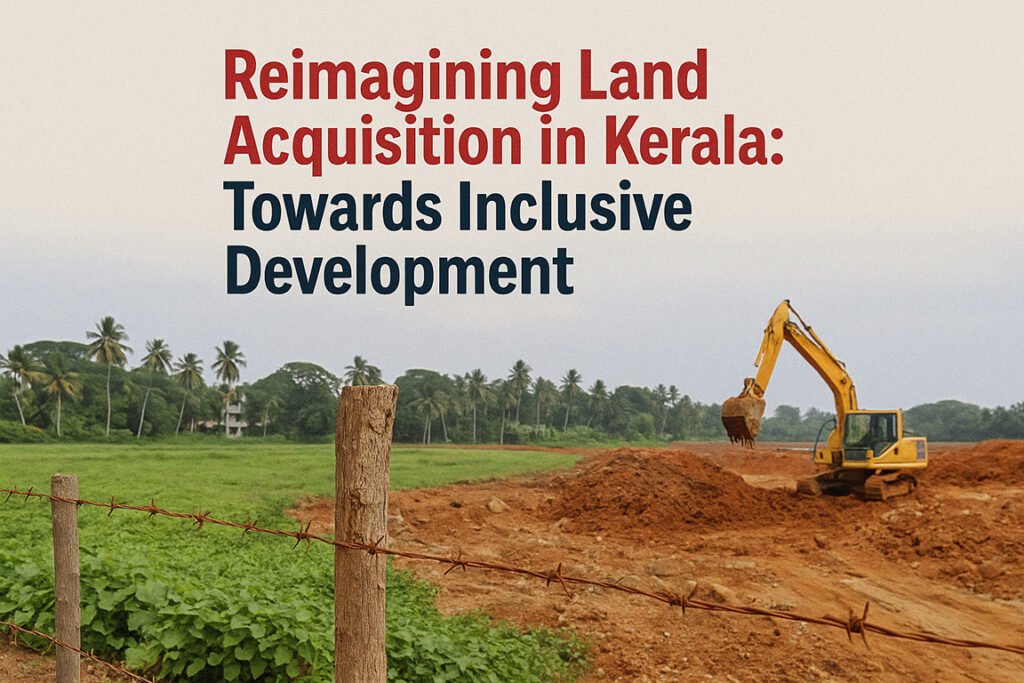
Reimagining Land Acquisition in Kerala: Towards Rapid Development
Land acquisition remains one of the most contested issues in Kerala’s development journey. The state’s dense population, fragmented landholding patterns, and high levels of political consciousness have made the process highly complex. While infrastructure and industrial projects are essential for Kerala’s growth, the inability to acquire land fairly and efficiently has often delayed or derailed them. Addressing these issues requires innovative policies rooted in transparency, fairness, and community participation.
The Challenges of Land Acquisition in Kerala
Kerala’s geography and social structure amplify the difficulties of land acquisition. With one of the highest population densities in India, even small parcels of land often involve multiple stakeholders, including extended families. Additionally, land is not just an economic asset but a matter of identity, security, and social status. This makes displacement deeply sensitive.
Historically, several development projects in Kerala have faced hurdles due to land acquisition challenges:
- Vizhinjam International Transshipment Port: Announced in 1991, the project faced decades of delay primarily because of protests over displacement and inadequate compensation. Work only began in earnest after multiple rounds of negotiation and modification to rehabilitation packages.
- National Highway Expansion: The four-laning of NH-66 faced stiff opposition as landowners resisted surrendering land at rates below prevailing market values. The lack of a transparent valuation mechanism aggravated mistrust between communities and authorities.
- Cochin Smart City Project: Envisioned as a major IT hub, the project’s progress stalled for years due to acquisition bottlenecks, with disputes over land price and rehabilitation delaying its implementation.
These examples illustrate how unresolved land disputes translate into lost opportunities for employment, infrastructure, and growth.
Towards Solutions: A New Framework for Land Acquisition
To overcome these challenges, Kerala must embrace a more participatory, transparent, and fair system of land acquisition. Some key solutions include:
- Transparency and Participation: Conduct open consultations with local communities before finalising project plans. Holding public hearings to discuss rehabilitation, compensation, and environmental impacts can help build trust and reduce resistance to developmental projects.
- Fair and Flexible Compensation Models: Move beyond outdated land records and offer market-linked compensation or annuities tied to project revenues. For example, instead of a one-time payout, landowners near highway projects could receive annual compensation for a fixed period.
- Community Benefit-Sharing: Community benefit-sharing includes guarantees for local employment, housing, and welfare programs. The Vizhinjam project gained momentum when the government pledged rehabilitation, jobs, and housing for the fishing communities that were displaced.
- Technology and Efficiency: Accelerate the digitisation of land records under initiatives like Bhoomi Keralam. Utilise GIS mapping to identify less disruptive tracts of land for projects, thus reducing litigation and delays.
- Legal and Institutional Reforms: Create a fast-track grievance redressal system so disputes don’t drag for years. For instance, a Kerala Land Mediation Authority comprising government, civil society, and judicial representatives can resolve disputes outside the courts.
- Alternative Models to Acquisition: Implement land pooling, similar to Gujarat and Andhra Pradesh, where landowners contribute their land for projects and, in return, receive smaller but high-value developed plots. Additionally, long-term leasing can replace outright acquisition in industrial parks or logistics hubs.
- Changing Social Attitude: Kerala’s has a long history of celebrating labour protests, shutting down factories and businesses as an achievement rather than celebrating innovation, entrepreneurship, and wealth creation. It would also not be wrong to say that there is a significant section of Kerala’s population that sees businessmen as a synonym for criminals. As long as Kerala society’s attitude towards business doesn’t change and we don’t start celebrating businessmen and entrepreneurship at a social level, Kerala has no hope of solving issues such as those related to land acquisition.
- Lack of trust in government: Addressing people’s trust in government machinery is also important. There is a general perception that government machinery is corrupt and will betray ordinary people if they do not organise. People need to be able to believe that the government will keep the agreement it makes with them; without that, people will hesitate to hand over their land for any project, irrespective of government promises.
Building Trust for Long-Term Growth
Ultimately, the success of any land acquisition process in Kerala depends on trust. Heavy-handed approaches are unsustainable in a politically aware and socially mobilised society. Instead, participatory governance, innovative compensation mechanisms, and community-centered development are essential.
By addressing land acquisition through these reforms, Kerala can unlock stalled infrastructure projects, attract investments, and ensure inclusive growth without alienating its people. Reimagining land acquisition is thus not just about economic progress but about reaffirming Kerala’s social contract between the state and its citizens.